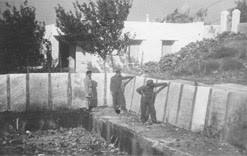The United States Holocaust Memorial Museum recently received an exceptional and unique collection of research resource materials that give voice to the Sephardi victims of the Holocaust. This extensive library of scholarly, sacred, and secular texts, both published works and numerous doctoral theses and other unpublished manuscripts, as well as music, songs, art, and recordings, is the gift of Haïm-Vidal Sephiha, a renowned scholar of Judéo-Espagnol language and culture and a Holocaust survivor.
Haïm-Vidal Sephiha is Professor Emeritus in Judéo-Espagnol at the Université Paris Sorbonne Nouvelle, Associate Professor at the Free University of Brussels’ Martin Buber Institute, and President of the Vidas Largas Association, which promotes the language and culture of Judéo-Espagnol. This remarkable and unique collection, gathered over 60 years, reflects Professor Sephiha’s dedication to preserving and teaching about the Judéo-Espagnol language and culture and the Museum’s determination to ensure the memory of the Judéo-Espagnol communities destroyed by the Nazis.
This memorial plaque in Judéo-Espagnol was dedicated on March 24, 2003 — the 60th anniversary of the departure of the second convoy of Jews from Salonika for Auschwitz.
A survivor of Auschwitz, Malines, Fürstengrube, Gleiwitz, Dora, and Bergen Belsen, Professor Sephiha led a successful recent effort, through the organization Judéo-Espagnol à Auschwitz, to dedicate a memorial plaque at the Auschwitz camp in memory of the victims of Judéo-Espagnol heritage from many countries who perished at the camp.
THE HAÏM-VIDAL SEPHIHA JUDÉO-ESPAGNOL COLLECTION includes rare, antique books dating from the 15th century; weekly and monthly periodicals of the Sephardic communities of Israel, Europe, and South America; recordings of courses taught by Professor Sephiha; interviews with other scholars; songs in Judéo-Espagnol, Hebrew, Berber, Russian, Judeo-Arabic, and Yiddish; and a variety of sacred texts including Bibles, prayer books, and biblical commentaries. Contemporary works in the collection range across multiple disciplines, from historical studies to serial novels and folk tales to studies of minority languages and cultures. The collection is currently in the process of being catalogued.
Jewish children from Salonika pose in folk costumes (prewar). USHMM, courtesy of Oro Benveniste
Scholars of history, Jewish studies, literature, philosophy, religion, comparative genocide studies, and others are encouraged to use these new resources to explore Sephardic history and culture, document the experience of Sephardi communities before and during the Holocaust, and ensure future generations an accurate understanding of the immensity of the loss of Sephardi communities during the Holocaust. The Museum will continue to sponsor special programs to encourage use of THE HAÏM-VIDAL SEPHIHA JUDÉO-ESPAGNOL COLLECTION and new attention to the topics it covers.
Haïm-Vidal Sephiha discusses his personal experiences during the Holocaust. USHMM, photo by Carl Cox
During a recent visit to the Museum, Professor Sephiha recorded a live on-stage interview and a video testimony regarding his life and work. These will both be available to interested scholars and visitors to the Museum.
The United States Holocaust Memorial Museum is grateful to Haïm-Vidal Sephiha for his exceptional contribution to the Museum’s research collection.
Haïm-Vidal Sephiha is honored for his donation to the Museum. Pictured (L to R): Paul Shapiro, Director of the Center for Advanced Holocaust Studies; Ingeborg Sephiha; Haïm-Vidal Sephiha; Sara Bloomfield, Director of the Museum; Dominique Vidal, Prof. Sephiha’s son. USHMM
Cataloguing of the Bibliothèque judéo-espagnole de Haïm-Vidal Sephiha/The Haïm-Vidal Sephiha Judéo-Espagnol Collection is ongoing. Materials already catalogued are listed on the library website. View Collection
The United States Holocaust Memorial Museum’s Center for Advanced Holocaust Studies awards fellowships to support significant research and writing about the Holocaust. Scholars, postdoctoral researchers, and graduate students interested in doing research in the Museum’s research collections should consider applying for a fellowship. Learn More
The Center sponsors Summer Research Workshops that encourage groups of scholars working in closely related areas of study to gather to discuss a central research question or issue; their research methodologies and findings; the major challenges facing their work; and potential future collaborative scholarly ventures. Learn More







Artículos Relacionados: